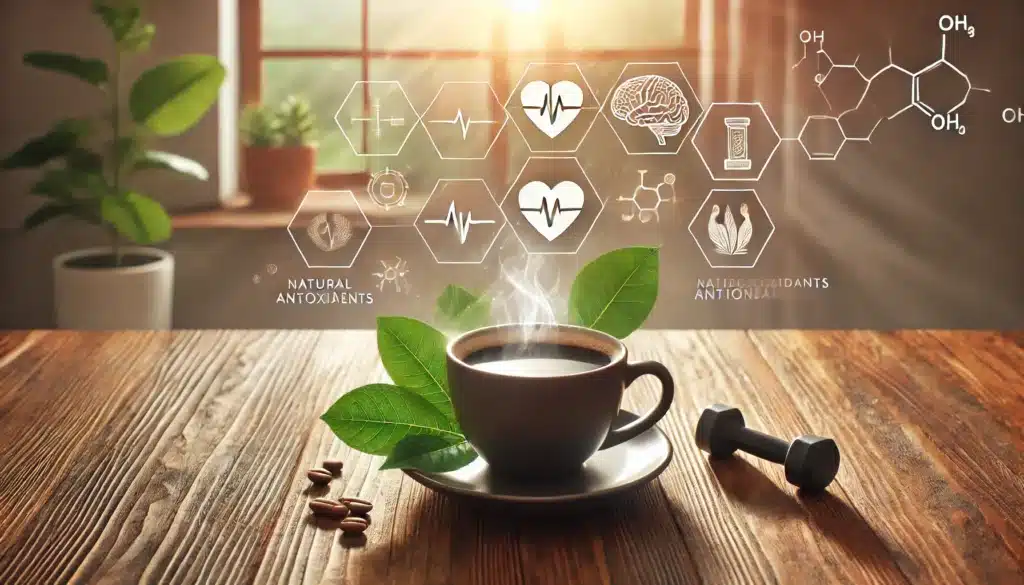Coffee is more than a morning ritual — it’s a complex beverage with hundreds of bioactive compounds that can influence your body and mind in powerful ways. For years, researchers have studied coffee’s impact on health, and the results are both fascinating and encouraging.
In this article, we explore what science really says about the health benefits of coffee — from brain function to longevity — and why moderate consumption might be one of the smartest daily habits.
1. Coffee Is Packed with Antioxidants
Coffee is one of the richest sources of antioxidants in the modern diet. These compounds help fight oxidative stress and inflammation, which are linked to aging and chronic diseases.
The key antioxidants in coffee include:
- Chlorogenic acids
- Caffeic acid
- Melanoidins (formed during roasting)
These protect your cells and support your body’s defense systems.
2. It May Lower the Risk of Type 2 Diabetes
Multiple large-scale studies have shown that regular coffee drinkers have a lower risk of developing type 2 diabetes.
Researchers believe this benefit is linked to:
- Improved insulin sensitivity
- Antioxidant effects on pancreatic cells
- Reduced inflammation
Both caffeinated and decaf coffee have shown similar results.
3. Coffee and Heart Health
While caffeine can temporarily raise blood pressure in some individuals, recent research suggests that moderate coffee intake may reduce the risk of cardiovascular disease.
Benefits include:
- Improved endothelial function (blood vessel health)
- Lower risk of stroke
- Reduced levels of some inflammatory markers
The sweet spot appears to be 2 to 4 cups per day.
4. Supports Brain Health and Cognitive Function
Coffee can boost alertness, focus, and memory in the short term, thanks to its caffeine content.
But more importantly, long-term studies link coffee to:
- A reduced risk of Alzheimer’s and Parkinson’s disease
- Slower age-related cognitive decline
- Better mental performance in older adults
Neuroprotective effects may be related to both caffeine and antioxidants.
5. Boosts Physical Performance
Caffeine increases levels of adrenaline and mobilizes fatty acids from fat tissues, improving endurance and reducing perceived exertion.
This makes coffee a natural performance enhancer for:
- Athletes
- Fitness enthusiasts
- Anyone needing an energy boost pre-workout
It’s most effective when consumed 30 to 60 minutes before exercise.
6. Supports Liver Health
Your liver may thank you for that second cup. Studies show that coffee drinkers have a lower risk of liver conditions, including:
- Fatty liver disease
- Cirrhosis
- Liver cancer
This benefit is seen in both caffeinated and decaffeinated coffee, pointing to other protective compounds.
7. May Help with Mood and Depression
Coffee stimulates the release of dopamine and serotonin, two neurotransmitters associated with pleasure and mood regulation.
Research suggests:
- Lower risk of depression among coffee drinkers
- Possible reduction in suicidal ideation with moderate intake
- Enhanced mental alertness and motivation
However, balance is key — too much caffeine can increase anxiety in sensitive individuals.
8. Could Promote Longevity
Some of the most compelling research shows a link between coffee and reduced risk of premature death.
Meta-analyses of cohort studies indicate that coffee drinkers may have:
- Longer life expectancy
- Lower mortality rates from various causes
- Benefits across diverse populations and lifestyles
This suggests that coffee supports general health and resilience.
9. Supports Digestive and Metabolic Health
Coffee can stimulate bile production and gastric secretions, which aid digestion. Some studies also link it to:
- Healthier gut microbiota
- Reduced risk of gallstones
- Improved metabolic rate
Drinking black coffee (without sugar or cream) maximizes these digestive benefits.
10. It’s Safe — in Moderation
The scientific consensus is that 3 to 5 cups of coffee per day is safe for most healthy adults and can be beneficial.
Exceptions may include:
- Pregnant women (limit to 200 mg caffeine/day)
- People with arrhythmias or severe anxiety
- Individuals sensitive to caffeine or acidic foods
As always, listen to your body and consult a healthcare provider if needed.
Final Thoughts: A Cup Full of Health
Coffee isn’t just a wake-up call — it’s a functional beverage with impressive scientific backing. From heart and brain health to performance and longevity, it offers a wide range of benefits when consumed in balance.
So go ahead — pour yourself a cup, and know that you’re doing more than fueling your day. You’re investing in your health, one sip at a time.







